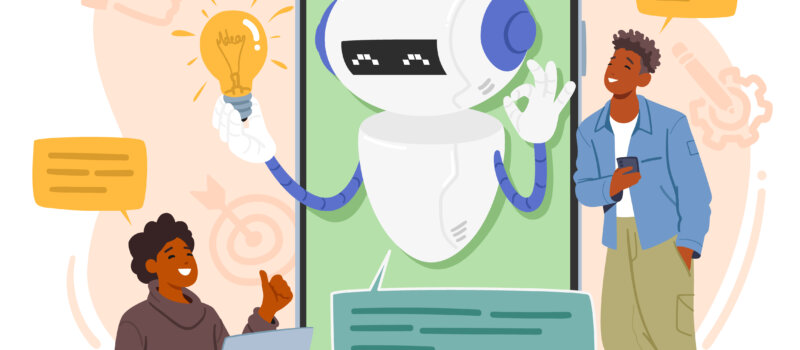Delivering exceptional customer experiences is often a cornerstone for success. Customer-centric businesses approach customer service to make connections and build loyalty. One of the greatest assets needed to accomplish this is agents. Those with advanced customer service agent skills support your mission around service.
So, what skills are the most valuable? And how do those skills drive success?
Developing Customer Service Agent Skills Pays Off
Your company has a much better path to growth and customer retention when you upskill and support agent development. When customers have satisfying interactions, you can reap the rewards. When customers perceive service as excellent, 78 percent of them will do business with you again. Additionally, 64 percent of business leaders say customer service positively impacts growth.
So what skills are the most essential?
12 Top Customer Service Agent Skills
Building a contact center team requires agents that have diverse skill sets. You’ll want to look for these in recruiting new hires. If the person has potential, you can provide training and coaching to bring out their best. Once agents begin work, continue to provide opportunities for skill development and enhancement. You’ll be able to monitor their process through reports from your contact center software regarding their performance.
Let’s look at the skills most attractive for agents.
Effective Agents Are Problem Solvers
In most cases, customers are contacting you because they have an issue. Those can be minor or urgent. When they connect to support , they expect a fast resolution. Agents need to be investigators to discern the facts of the situation, which correlates to excellent problem-solving skills. They’ll need easy access to information about the customer, which you can provide with a CRM (customer relationship management) integration with your contact center platform.
Additionally, when trained on that product or service line, agents can resolve issues. To avoid frustration from customers and employees, you’ll want smart routing features that assign people to the right queue.
An Agent with Patience Can Deescalate Situations
Patience is another soft skill agents can hone. It is something you can improve upon, and it can be a calming force on angry customers. Being patient means you can listen to their concerns and respond respectfully, improving the chances of conflict resolution.
Attention to Detail Is Critical for Agents
From patience, your agents can be active listeners. That skill will complement being detail-oriented. This attention is useful when trying to diagnose a root cause of an issue. It involves asking the right questions to gather all the information necessary to serve the customer’s needs most accurately.
Great Agents Are Empathetic
Another personality trait ideal for contact center agents is empathy. Having emotional intelligence when dealing with people that are less than happy means they don’t take it personally. They can understand the situation for what it is and will work to help the customer in the best way possible.
This skill may be one of the hardest to develop. It’s an emotional response to validate the customer. Your contact center leaders can work with agents on this skill with quality assurance tools in your contact center solution. You can record calls to play back in coaching.
Agents with Strong Communication Skills Have a High Value
Communication skills for agents are distinct from others. After all, agents typically do less talking or typing than customers. Being a strong communicator includes being an active listener and sticking to the situation.
Agents don’t need to be gabbers; they’re better off not being one. Communicating clearly and simply with a personable approach leads to higher customer satisfaction. They can do this by focusing on using positive language. Here’s an example:
- Without positive language: “The product you need isn’t available. It’s on back order for at least the next four weeks.”
- With positive language: “The product is available next month, and I can go ahead and place the order for you today.”
The difference is in framing the response. By taking a positive approach, your customers feel less frustrated about a backorder.
Product Knowledge Equips Agents to Become Experts
Depending on the size and complexity of your business, you may have multiple products or services. The more agents interact with these products and learn about them, the better they’ll be in customer interactions.
Ensure your agents receive training on these regularly. Special sessions will also be helpful before new releases or product launches. Agents that are curious by nature and want to learn will be excellent representatives for your company. Remember, this group has the most customer interactions, so it’s worth investing in regular training.
An Adaptable Agent Is an Able Agent
Finally, adaptability and flexibility are skills that customer service reps should possess. Contact centers are high-volume, sometimes chaotic environments. They’ll be fielding calls, chats, emails, and more on a range of issues from customers who are all different as well. Thus, being adaptable is a survival skill that the best agents will have.
As your business grows, there will be additional changes. When agents are flexible, they have a growth mindset, which means they’ll be amenable to change.
Time Management Is Key to Success
Good customer service starts with effective time management. Agents must prioritize tasks to ensure customer issues are addressed promptly while meeting customer expectations. For instance, they might focus on resolving a high-priority complaint before handling routine customer questions. This skill helps agents stay organized and maintain a seamless customer service experience, even during busy periods.
Time management is a hard skill that requires discipline and practice. Agents who know how to structure their workflow can reduce stress and improve overall productivity. By staying on top of their responsibilities, they not only deliver better service but also foster stronger customer loyalty, leaving customers feeling valued and respected.
Active Listening Builds Better Connections
Active listening is essential for delivering a meaningful customer service experience. It allows agents to fully understand customer issues and respond in ways that exceed customer expectations. For example, an agent might say, “I understand your concern about the delayed shipment. Let me prioritize finding a solution for you.” This approach reassures customers that their concerns are being taken seriously.
Agents with strong active listening skills also excel in their communication style. They ask clarifying questions, acknowledge customer feedback, and summarize key points to ensure understanding. By showing they know how to listen attentively, agents can foster customer loyalty and build trust in every interaction.
Tech Savviness Empowers Agents
Tech-savvy agents are invaluable in today’s fast-paced customer service environment. Knowing how to navigate support systems and databases allows agents to respond to customer questions quickly and accurately. For instance, accessing a product catalog to provide immediate answers to warranty inquiries demonstrates competence and reinforces customer confidence.
This hard skill is crucial for meeting customer expectations efficiently. Agents who regularly update their technical know-how can handle complex situations with ease, ensuring good customer service. When agents feel confident with the tools they use, they’re better equipped to strengthen customer loyalty through smooth and professional interactions.
Navigating Escalations with Confidence and Clarity
Escalations are a natural part of customer service, but handling them effectively can make all the difference in maintaining customer satisfaction. When a customer’s issue exceeds the agent’s ability to resolve it, they must know when and how to escalate the situation. It’s not just about transferring the call; it’s about ensuring a smooth transition to the right team or department with all necessary details to avoid further frustration. A good agent will assess the situation, recognize signs of heightened frustration, and escalate the matter quickly to avoid the issue lingering.
Effective communication is an essential customer service skill during escalations. Agents should clearly explain the escalation process to the customer, setting proper expectations about next steps and timelines. By maintaining professionalism and keeping the customer informed, agents can minimize tension and ensure a positive experience even in a difficult situation. With clear communication, the customer feels heard, and the issue is handled with care. With the right training, tools, and a clear escalation process, agents can turn potentially negative situations into opportunities to demonstrate the company’s commitment to resolving customer concerns.
The Power of a Positive Attitude
A positive attitude is one of the most powerful tools a customer service agent can possess. When agents approach every interaction with optimism, they can defuse tension, even in challenging situations. A customer’s experience can drastically improve when they sense the agent is committed to resolving their issue with a positive, can-do attitude. This mindset not only reassures the customer but also creates an environment where solutions are more likely to be found.
Having a positive attitude is more than just being friendly; it’s about maintaining a solution-focused approach, no matter how difficult the situation may be. A key interpersonal skill, positivity allows agents to be proactive in addressing customers’ problems and ensures that they feel heard and valued. Agents with this mindset contribute to effective customer service, making customers more likely to return to a business that offers both a helpful attitude and a focus on resolving their concerns.
Strong Organizational Skills Keep Agents on Track
In a customer service role, organizational skills are essential for agents to manage their time and tasks effectively. Agents must juggle multiple customer queries, follow-ups, and resolutions, all while maintaining an organized workflow. Without these good customer service skills, agents can quickly become overwhelmed, leading to delayed responses and frustrated customers.
By leveraging tools like task management systems and CRM integrations, agents in a call center can stay on top of their responsibilities and prioritize customer needs effectively. This ensures timely responses and that no issue goes unresolved, helping maintain a seamless customer service experience. When agents are organized, they not only improve efficiency but also create a more positive customer experience, building trust and satisfaction. As a result, their customer satisfaction scores are likely to improve, making them valuable team members who contribute to the overall success of the center.
Emotional Intelligence Helps Agents Connect with Customers
Emotional intelligence is crucial for agents in any customer service role, especially when dealing with customers in various emotional states. By understanding and responding to a customer’s emotions, agents can manage challenging situations with empathy and calm. This ability to read the room and adjust their communication style accordingly makes a significant difference, especially when handling upset or frustrated customers.
With strong emotional intelligence, agents can de-escalate tense conversations, validate the customer’s feelings, and find solutions that address both the emotional and practical needs of the situation. By being able to connect with customers on a personal level, they ensure a positive customer experience, even when resolving difficult issues. Whether it’s in a call center or on other communication platforms, this emotional awareness leads to improved customer satisfaction scores and helps reinforce long-term customer relationships. When agents act as team members who understand customers’ emotions, customers feel heard and valued, increasing their loyalty and overall satisfaction.
Proficiency in Customer Service Agent Skills Create Exceptional Experiences
Seeking out and continuing to develop these skills for customer service professionals can be a competitive advantage. An excellent customer service team is empathetic, curious, growth-minded, and patient. As a result, your customers get the best experience.
Learn more about serving customers in every channel by reading How to Deliver an Omnichannel Customer Experience .
December 10, 2024
Explore other posts on these topics: Contact Center





